Case study: risks of traditional pastime exposed
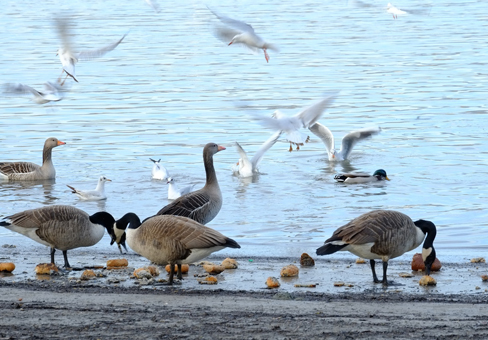
 For London marketers, looking to develop their professional capabilities, we’re providing a series of case study articles which highlight excellent marketing practice. Here, we focus on the marketing campaign of the Canal & River Trust (formerly British Waterways), which scooped the 2016 CIM Marketing Excellence Award for its public education campaign in London and across the country.
For London marketers, looking to develop their professional capabilities, we’re providing a series of case study articles which highlight excellent marketing practice. Here, we focus on the marketing campaign of the Canal & River Trust (formerly British Waterways), which scooped the 2016 CIM Marketing Excellence Award for its public education campaign in London and across the country.
The Canal & River Trust is tasked with protecting 2,000 miles of waterways in England and Wales but it relies on public support to be effective. So how did the charity raise awareness of its ecological work maintaining the riverside environment? It tackled an overlooked issue with new advice that challenged a well-loved family tradition. The issue was ‘healthy diets for ducks’. The ill-advised tradition it exposed was the family pastime of feeding bread to ducks. By taking a stand and exploiting video and broadcast media, the Trust created a significant impact on consumer behaviour resulting in 20% fewer people feeding bread to ducks a year later. The campaign has been recognised with a CIM Marketing Excellence Award.
News video warns against bread-feeding tradition
Together with the agency behind the campaign, markettiers4dc, the Trust created a pre-recorded campaign video which warns against feeding ducks bread, as well as staging expert interviews. The video shows an ecologist teaching children and their parents how to help keep wildlife and the waterway environment healthy. Whilst the fact that its bad to feed ducks bread isn’t the most startling news, the interviews and video formats provide legitimacy – and enable the media to announce the Canal & River Trust’s new initiative.
Eco-friendly campaign scoops award
The public education campaign developed by the Canal & River Trust won an integrated marketing communications award in 2016. The entry deadline for the 2017 CIM Marketing Excellence Awards is 25 November 2016. With more than a dozen categories, the awards turn the spotlight on marketing campaigns which have made a difference across our industry. We’d love to see London members represented amongst the winners. Take a look at past winners and consider entering these prestigious awards.
Live interviews and pre-recorded videos
The Trusts’ education campaign kicked off in March just before the first day of Spring. Media relations activity built interest for the story and the campaign began with a Radio 5 Live interview of the Canal & River Trust’s national ecologist Mark Robinson, on the breakfast show. Further radio interviews and TV interviews took place across the country.
As well as broadcast interviews, ready to use materials were created. This included pre-recorded videos plus b-roll video snippets to introduce the story with cutaways, and social media assets.
Key educational messages
Central to the campaign were clear facts about how much bread was being fed to ducks and healthier diet options.
- 12 million people feed bread to ducks each year
- 6 million loaves of bread are thrown into the waterways annually
- Bread damages habitats causing algae, bird disease and encourages rats
- Healthy alternatives like corn or peas are better for wildlife and the environment
Extensive coverage about healthy duck diets
The issue has resonance with a broad audience enabling the campaign to secure media interest.
- Sell-in to the media was effective with 32 interviews set up on national and regional TV and radio, leading to the story being covered over 170 times.
- Coverage included: Radio 5 Live, Sky News Radio, Newsround, ITV West, Central and London, Granada, Tyne & Tees and regional BBC stations.
- Pre-recorded features were aired on ITV’s Good Morning Britain and Channel 5’s The Wright Stuff.
- News coverage was gained with the Daily Express, Mirror Online, The Guardian, The Independent, The Telegraph, Metro and regional news titles.
Headlines say it all
The campaign retained a very clear focus. If you only saw the news headlines, you’d still have grasped the message, as these ten headlines demonstrate:
- ‘Londoners warned to stop feeding ducks bread - and give them oats, corn or peas instead.’ Evening Standard
- ‘Feed ducks frozen peas instead of stale bread, charity asks’ The Independent
- ‘Don’t feed the ducks bread say conservationists’ The Guardian
- ‘‘Don’t feed us junk food’ plead ducks on the breadline on Regent’s Canal’ Hackney Gazette
- ‘Canal & River Trust advises to feed ducks with veg not bread’ Chester Chronicle
- ‘The perils of feeding bread to ducks’ BBC Magazine Monitor
- ‘Duck danger: Why feeding ducks bread is bad for their health’ International Business Times
- ‘Canal and River Trust call on Tamworth residents to keep ducks and birds healthy’ Tamworth Herald
- ‘Feeding ducks bread 'causes them stress and misery'’ ITV report
- ‘What? We’re not allowed to feed ducks bread any more’ Metro
Social media
The campaign gained traction on social media, even being tweeted by Take That’s Howard Donald. Campaign hashtags could have made the campaign even easier to share.
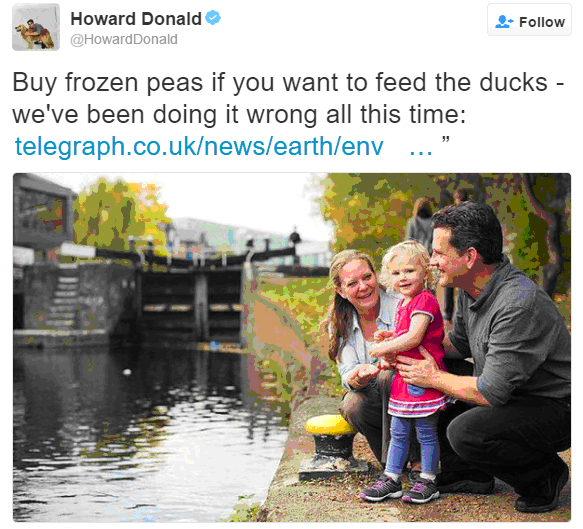
Tweets from @CanalRiverTrust were retweeted by riverside communities:
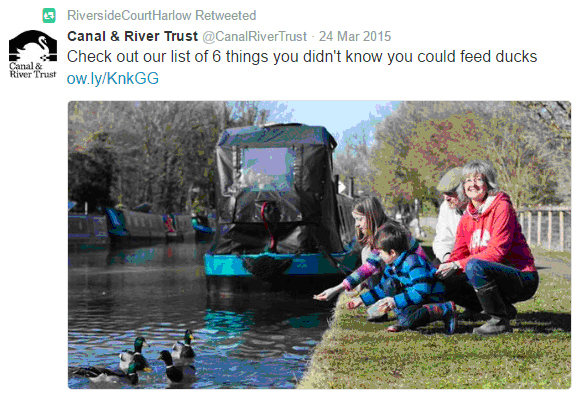
Environmental groups spread the word:
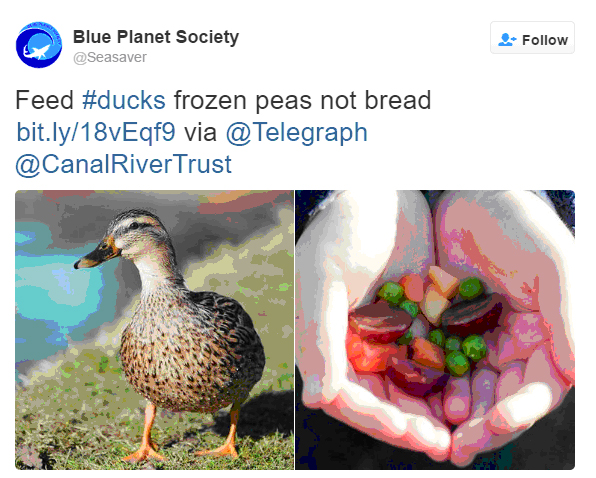
The message was flagged on Trending UK News.
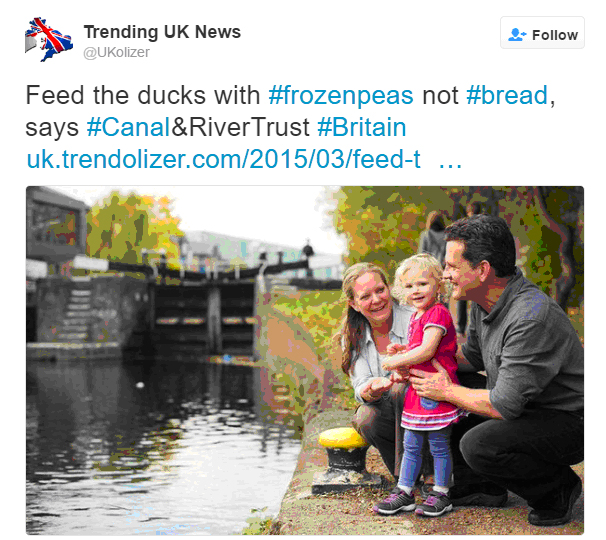
Impact of duck diet campaign
The campaign generated coverage in 2015 with key messages clearly publicised. This year, the Trust has reported a major shift in public behaviour.
- 20% fewer people feed bread to ducks overall
- 23% drop in South East
- 22% drop in North East
- 80,000 fewer loaves fed to ducks since the campaign
Want more?
See the case study for The Senet Group: When is it a case of Bad Betty?
